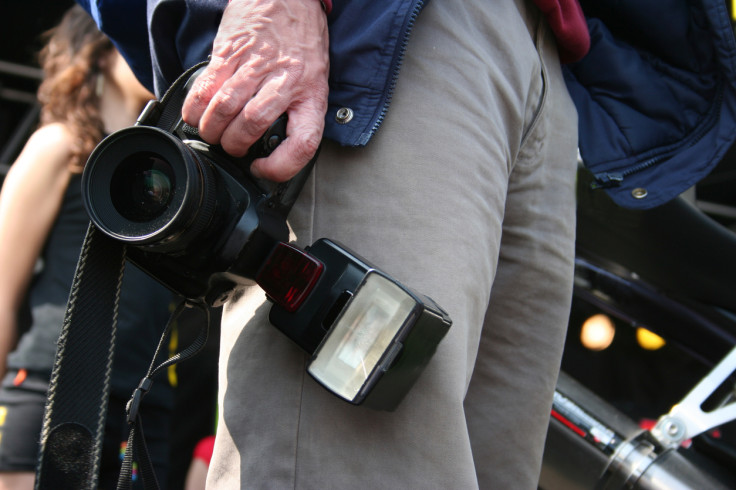Photographer claims Scottish police held his cameras ransom in exchange for suspect pics
A press photographer claims the Procurator Fiscal seized his equipment to make him hand over photographs.

A press photographer in Scotland is claiming that the Procurator Fiscal used a warrant to seize all of his electronic equipment in order to threaten him into turning over photographs that they needed in an ongoing prosecution.
Andy Smith, a news photographer based in Inverness, claims that he was covering a trial at a local court in December 2016 when he witnessed an altercation between people involved in the case.
He photographed the incident, but then received a phone call from a police officer asking him to surrender the photos he had just taken to the police so that they could use it as evidence against one of the people involved in the altercation.
Smith consulted his union, the National Union of Journalists (NUJ), and was told to ask the police for a production order, because if he voluntarily handed over the images it would have compromised his impartiality as a press photographer. He did so and a copy of the photos were stored by the NUJ in a secure off-site location.
Police requested photographer surrender his photos
The production order is a standard procedure – it requires the photographer in question to either co-operate with the request, or the union can seek to contest the order. But to Smith's surprise, instead of issuing the production order, the Procurator Fiscal, the Scottish equivalent of the Crown Prosecution Service, instead applied for a warrant to raid Smith's home.
The warrant allowed the police to seize all of Smith's electronic equipment "if necessary by force", which means anything from his PC to his cameras, smartphone, tablet, video games consoles, memory cards and portable storage devices.
Smith and the NUJ challenged the warrant in court but at the final hearing, Smith and his union representative were both barred from entering. Eventually Smith was allowed to observe, but he was not permitted to answer questions posed by the judge – known as a "Sheriff" in Scotland – on journalism ethics, and Smith's solicitor did not know the answers.
In the end, the warrant to seize all of Smith's electronic equipment, including his cameras, which would prevent him from working, was granted. But then the police didn't execute the warrant that was granted and raid Smith's home.
Instead, the Procuator Fiscal contacted the NUJ and told the union that if Smith handed over the photographs within 24 hours, then they wouldn't execute the warrant.
Hand over the photos and we won't raid your home
"That's what it had all been about. I don't believe the Fiscal had ever wanted to seize my cameras or computer, he just wanted the threat of it to use as a bartering tool: The police couldn't legally force me to hand over the photos but if I didn't do so then they would execute the warrant and put me out of business," Smith wrote in a blog post.
"Again I took advice from the NUJ and they advised me to hand over the photos. We could appeal the warrant, but the police could simply execute it before the appeal was heard. I'd lose all of my equipment for possibly a year or more, and a 15-year career would be over."
Smith decided it was in his best interests to surrender the photographs to the police, but he now lives in fear that the police could raid him at any time, because there is no time limit on the warrant that was granted.
"Two weeks ago a senior police officer at a road accident ordered me to stop recording audio and delete any video that I'd already shot. I didn't delete the video so the officer took my press ID card, recorded my details, and told me that my camera would be seized," said Smith.
Scottish prosecutors and the NUJ weigh in
The Crown Office and Procurator Fiscal Service (COPFS) told IBTimes UK: "In this case the photographer took a number of photographs of a serious crime taking place, namely the accused interfering with a witness during a jury trial contrary to a bail order, outside Inverness sheriff court on 8th December 2016.
"The photographs constituted important evidence in the case and as he declined to provide them to the police it was necessary for the Crown to make an application allowing the police to obtain the evidence by virtue of a search warrant.
"The application was heard at Inverness sheriff court and submissions were made by the various legal parties. Having weighed up all matters the court granted warrant and the photographer thereafter provided the evidence to the police and the Crown. The material was disclosed to the defence and was included in the indictment. The accused pled guilty to the charge and was sentenced to 243 days' imprisonment."
The NUJ's acting general secretary Séamus Dooley told IBTimes UK that the union regularly supports appeals against disclosure orders in order to ensure that the journalistic privilege offered to journalists and press photographers is not undermined.
"The right of journalists to protect confidential sources of information has been recognised in European law, mainly through the work of the NUJ in supporting the Goodwin case at the European Court of Human Rights," said Dooley.
"Police should refrain from using orders as a means of inhibiting photographers in their work. Mindful of our obligations under data protection legislation the union does not comment on specific legal advice given to individuals but I am satisfied that in all cases we do our utmost to secure the best representation and give high quality advice. We also have procedures which allow members to raise concerns with the service offered by the union."
© Copyright IBTimes 2025. All rights reserved.






















